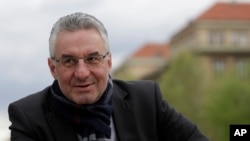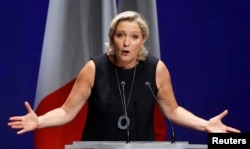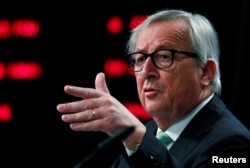The European Parliament is expected to be a different legislature after next week's election, and leading Czech conservative lawmaker Jan Zahradil is hoping that voters embrace the idea of a scaled-back European Union.
Zahradil is a moderate critic of the bloc, not a firebrand like French euroskeptic Marine Le Pen, and he is campaigning for a more flexible EU.
"I'd call it a multi-speed European Union with more space for the national governments and parliaments," Zahradil told The Associated Press in an interview. "We want the European Union to simply do less and to do it better."
Zahradil is leader of the group known as the Alliance of Conservatives and Reformists in Europe, which is the third largest in the European Parliament. His group is unlikely to win the ballot in the May 23-26 elections. But he wants to contribute to reforming the EU and attract those critical of its policies with a promise of a more pliable and downsized Europe in the future.
The majority held by the center-right European People's Party and the center-left Socialists and Democrats in the European Parliament is expected to evaporate. And Zahradil is hoping that European conservatives will fill the void after decades in opposition.
Zahradil said his main objection to the EU is "a permanent effort to transfer the solving of all problems [from the national] to the European level, even though it's not effective."
"The European Commission, together with the European Parliament, uses every opportunity to gain more powers, to create an impression that we can't do without the EU. In many cases, it doesn't work."
Zahradil is a European Parliament member for the conservative Civic Democratic Party. He is also his group's candidate to replace Jean-Claude Juncker as president of the European Commission, the EU's executive arm.
He wants to replace the current EU mantra of "one size fits all" with a looser model of European integration.
Zahradil said that in the multi-speed Europe, it would be possible for the member states to unite their policies according to their wishes and needs.
"For example, if Germany and France agree to harmonize their taxes, that's fine but they should not force the others to join them," he said.
The group also wants the currencies in the countries outside the eurozone to become official EU tender alongside the euro, and doesn't want a majority vote in the EU to replace the unanimous vote in foreign affair issues because "it would only further increase tensions and divide the European Union rather than unite it."
In the European Parliament elections, the conservatives are aiming for more than the 76 seats they currently have in the 751-seat EU legislature.
Speaking about potential coalition possibilities, Zahradil said his group has a similar approach to the economy as the European People's Party , the biggest political group in the European Parliament or the liberals, known as ALDE.
On the contrary, the radical euroskeptics, such as the Europe of Freedom and Nations group that includes France's National Rally led by Le Pen, is an unlikely partner.
"It's difficult to imagine cooperation with those radical euroskeptics because they are against free trade and that's something what we on the contrary support, and at the same time they are for us too conciliatory with Russia, and that's another obstacle I can see for our cooperation."






